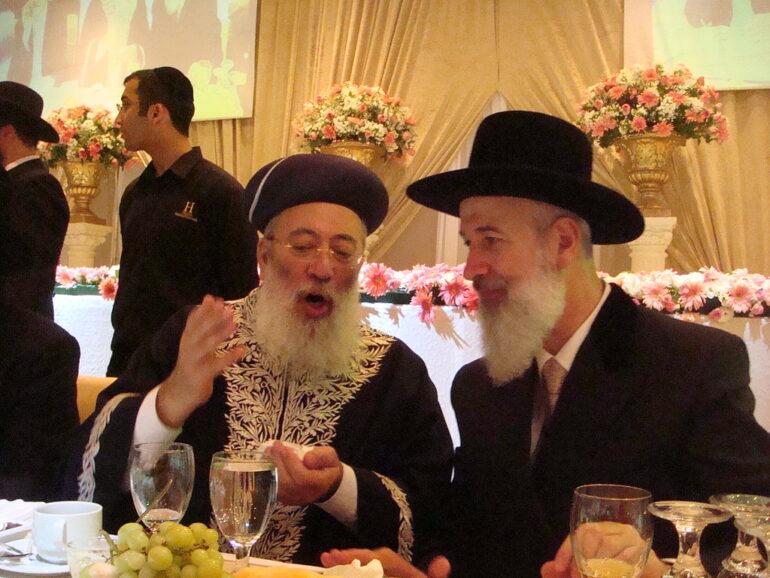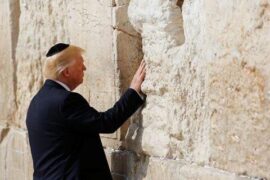When most Jews hear the term “halakhic state” they get nervous. What they usually fearusually fear is coerced personal behavior like being forced to observe Shabbat and Jewish dietary laws. This is most often likened to the Iranian regime’s use of Islamic police to coerce personal behavior.
It might be beneficial to break down what Jews who advocate for a “halakhic state” might actually mean.
But before getting into the details, let’s analyze the perspective of a typical liberal (even if traditional) Jew living in the West. He may be perfectly happy living in Britain or the United States or somewhere similar, engaging in Jewish rituals, say during Shabbat or Jewish festivals, while the other 90% of his life – his regular work life, social life and family life – is done in the typical Western fashion, no different than anyone else in the country.
But that begs the question regarding that other 90% of his life, the part not spent in Synagogue or at the seder table, the part where they are not being specifically “Jewish” but rather just being British or American: if there is a British way for the British and an American way for the Americans, could there not be a Jewish way for the Jews?
Let’s say for the sake of argument that in France they eat croissants and drink red wine. They all do that not because they are coerced but just because that’s who they are and that’s how the culture evolved.
Let’s consider what might happen to a French family who had just moved to Britain and are now sending their children to a British school. One day the children come home from school dejected and sad. The story comes out that during lunch the British kids made fun of them because they were eating croissants when all the other kids were eating shepherd’s pie. So now the kids are asking the parents to pack them shepherd’s pie for lunch. The parents might do their best to teach the kids about the value and meaning of French identity and culture. They might even send the children to after school French programs to learn to better appreciate croissants. But of course that would prevent their kids from going to the movies with their friends after school because they are stuck going to after-school French classes.
More and more, the French identity and culture that seemed so natural in France, begins to feel like coercion to the next generation raised abroad.
We Jews are a bit like the children in that story. Once upon a time we had our own culture. But then we were forced to move away and slowly our own culture came to be experienced as coercive rather than natural. Now that we are back in our land, we have to decide what to do – what will our culture be?
One could very easily dismiss my analogy by arguing that when people say “halakhic state” they’re not just talking about random culture – they’re talking about socially engineering and coercing an entire society in such a way that a large portion of said society doesn’t want. Fair enough. But before we deal with this issue in more detail, let’s consider how various societies can impact the world as a whole.
Just in the realm of political theory, French society gave the world Rousseau and Montesquieu and De Tocqueville. Am I sure that it was the red wine and croissants that did it? Of course not. All I know is that the milieu of French society (including croissants and red wine) gave rise to those ideas which ultimately made the world a better place (and contributed to many of the founding ideas which gave rise to the United States of America as we know it today).
So would it not be interesting to see what a uniquely Jewish society might eventually be able to produce and offer the world? Clearly my personal answer is yes, but the real question is how to get there. In order to do this, must we coerce everyone in our society to observe the laws of our Torah? Perhaps the answer is no. All aspects of Jewish culture should ideally be at play voluntarily, which is exactly what we see happening over time anyway, at least in the realm of personal behavior. Most Israelis want tradition and appreciate the value of our roots. Most take pride in passing over our national story to the next generation at the seder table.
But that is only the surface – only voluntary personal actions – only those things which could be taken with us into exile and preserved as what we call the Jewish “religion.” What about the myriad other aspects of national culture? For example, what about the civil aspects of our tradition? The law for example? What would be the effects of having a legal code informed by halakha?
I am not a legal scholar but my understanding is that current Israeli law is mainly based on pre-mandate British law. While there is nothing intrinsically wrong with British law – it seems to work well in Britain – would it not be interesting to see what a country would look like (ethically, morally, spiritually, socially) that was governed by our own Jewish law? Just as legal codes are a reflection of society, society is equally impacted by the values upheld in its legal codes.
Another example would be the healthcare system. Another would be the conduct of the military. Another would be how minority groups are treated. Again, while there may be nothing wrong with British values regarding the conduct of healthcare, the military, and minority rights, might it not be time to consider what a uniquely Jewish state might look like in those areas?
Clearly this does not mean that the Chief Rabbinate would dictate policy in all areas of life. What it does mean, however, is that it may be time to have a discussion about how to incorporate Jewish values, laws and ethics into the modern world. That is the exciting part of what a “halakhic state” could mean – not that I force you to celebrate Shabbat the same way I celebrate it, but that we embark on a journey together to discover what living in a deeply Jewish state could mean.
Despite this optimistic view of having a friendly national discussion on how to more fully incorporate our own native values and customs into the fabric of our national culture, we must also be realists. Personal actions and observances can surely be left voluntary but we must also reach agreement on certain things pertaining to the public space which spans the entire society. For example, do we have public transportation on Shabbat? We will have to argue about that and come to a resolution. While no one would coerce individual behavior, some things need to be decided in common. No matter how the issue is decided – no matter what compromises are made – there will undoubtedly be people who agree and who disagree, and public sentiment may even change over time. That is just the nature of how societies evolve. But just because there are issues which might engender disagreement doesn’t mean we should shy away from discussing them.
Now that we once again have a land of our own, maybe it’s time to take all of our accumulated potential culture and translate it into actual embodied culture. While such an endeavor should not be undertaken lightly and certainly not by coercion, neither should it be ignored. The founding generation of Zionists undertook the monumental task of creating the wonderful state that we all now share. Perhaps it is now our job to move on to the next monumental task.





